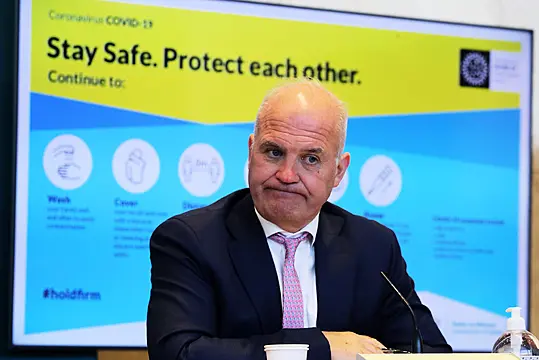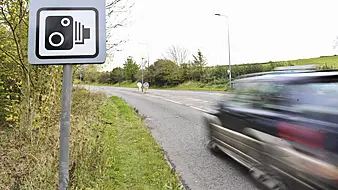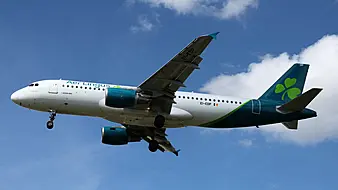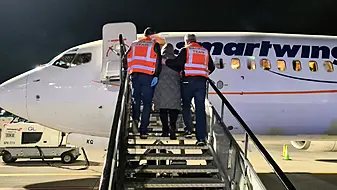Ireland is at the beginning of the fourth wave of Covid-19 and a “serious level of transmission” is expected in the coming weeks, public health officials have warned.
Speaking at a press briefing on Thursday, the chief medical officer, Dr Tony Holohan, said infection rates are beginning to rise once again.
“We see the five-day average more or less tracking up for the last week or 10 days. We think that’s going to lead us into another wave of transmission,” he said.
Addressing the spread of the Delta variant, Dr Holohan said it was “a question of when, rather than if” the Delta variant becomes dominant in Ireland, and said the aim was to slow down transmission as much as possible.
He said: “The evidence is that we have slowed this down somewhat, we would like to have slowed it down further. A couple of weeks back it began to move.
“As we have always done when we believe the evidence is there to support us changing policy, we take that action swiftly and proportionately in relation to the concerns that we have.
“We are going to experience very significant transmission. You will see what is happening in Scotland, they are a number of weeks ahead of us. Northern Ireland is probably two or three weeks ahead of us in terms of their transmission.
“All of that says to us in broad terms, we are not going to stop this, but the measures we have taken now have had an effect in slowing down that transmission.”
R number
Professor Philip Nolan, chair of the Epidemiological Modelling Advisory Group, said the R number has risen, and is now between 1 and 1.2.
He said the rise was “cause for concern” and pointed out that transmission rates were rising within groups of people who were unvaccinated or half-vaccinated.
Prof Nolan said: “We are in a concerning situation, we are seeing an increase in incidents across most age groups and we are seeing a stabilisation in hospitalisations, we would be concerned there might be an increase in those in the coming weeks.
“We are close to 390 cases a day now. We have to be concerned that we are at the beginning of an increase in incidents driven by the Delta variant, that presents significant dangers to the unvaccinated population and the partially vaccinated population. So it is necessary to reiterate the advice that we have to limit transmission as vaccination proceeds.”
He added: “If case numbers increase, albeit more slowly than they would have increased in previous waves of the disease, we are looking at high case counts for a very long period of time.
“Those cases would translate into very significant levels of hospitalisations, so we’re looking at three times the number of cases over the course of the next three months.”
Donegal spike
Deputy chief medical officer Ronan Glynn told the briefing that Donegal now has the highest Covid incidence rate in the Republic, while there has been a spike in Waterford and high rates also in Limerick.
Dr Ronan Glynn said: “We have some concerns about Dublin, while the incidence is not the highest in the country, the incidence has taken off there versus the rest of the country and given the population size of Dublin, if that continues it will drive the national picture.
“We are aware of the past number of weeks that Delta was present at a greater proportion in the Dublin area.
“One of the things doctors are telling us at the moment is that this is not like previously, that outbreaks are very easily seeding across community, across settings. Once it gets into a community it is spreading much easier than we have seen previously.”
“If we are not careful we will see sharp increases in new infections and deaths over the coming weeks and months.”
Communions
Dr Glynn said public health colleagues across the Republic had got in touch stating that they thought it would be “inappropriate” for communions and confirmations to go ahead.
He said: “It has been clear over the past number of weeks, some of you will have seen the request from public health colleagues in the mid-west that communions and confirmations wouldn’t go ahead there given the changed situation there over recent weeks.
“In response to that, public health colleagues around the country got in touch last week and were indicating that they felt that it would be equally inappropriate for communions and confirmations to go ahead in other parts of the country, given what they are seeing and given the nature of the clusters they are seeing.
“They are not straightforward clusters, if they get into a community they are spreading out really quickly through workplaces, through families, through social settings, through social gatherings, through extended family gatherings, and for all of those reasons it was our public health colleagues on the ground who felt that it wasn’t appropriate and they were seeking advice and guidance.
“From that respect I got in touch with colleagues across Government and asked that that be looked at. From a public health perspective we preferred that they would not go ahead over the coming weeks.”
A further 448 positive Covid cases were confirmed on Thursday evening.
The latest figures show there are 44 people in hospital with the virus, including 14 in intensive care.
The Department of Health confirmed two further deaths, bringing Ireland’s death toll to 5,000.







